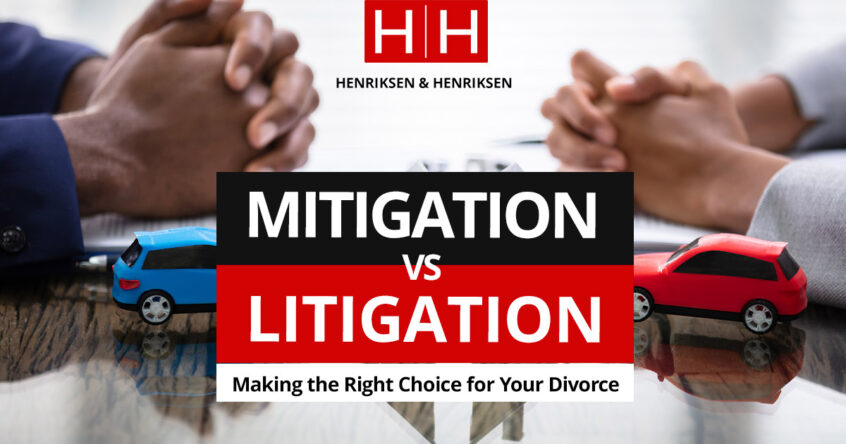Mitigation vs. Litigation: Making the Right Choice for Your Divorce

When you’re about to part ways with your spouse, it might seem like you have a million decisions to make. You must see eye-to-eye on how you’ll handle things like asset division, child support, and more. However, creating a mutually beneficial divorce agreement can be difficult. And if you’re unlucky, things can turn hostile. That’s why it’s crucial to consider the available options.
In this regard, two primary approaches stand out: mitigation and litigation. Each set has its own set of pros and cons, and making the right choice can significantly impact the outcome of your divorce as well as your emotional well-being.
Ready for the mitigation vs. litigation debate?
Let’s unpack the choices and figure out which route suits you best.
Mitigation: The Art of Finding Common Ground
Mitigation is a collaborative, amicable approach to divorce that aims to minimize conflict and keep things as civil as possible. In this process, both parties meet with a trained, neutral professional- in other words, a mediation attorney– to resolve issues of their separation/divorce.
Couples can begin the mediation process by simply hiring a mediator without filing a court petition. Also, mediators don’t decide the outcome of a divorce. They only attempt to help the couple reach a compromise and create a marital settlement agreement.
Benefits of Divorce Mitigation
Mediation offers several benefits that can make divorce cases smoother and less adversarial.
- Less Stress, More Harmony: One of the biggest perks of mitigation is the reduction of stress. Instead of duking it out in a courtroom, you and your ex-partner work together to find common ground.
- Cost-Effective: Litigation can be a financial black hole, with attorney fees piling up quickly. Mitigation, on the other hand, is often more cost-effective, as it involves fewer court appearances and less paperwork.
- Tailored Solutions: Mitigation allows for more personalized solutions. You and your ex get to decide what’s fair, rather than a judge who may not fully understand the intricacies of your unique situation.
- Maintaining Relationships: If you have children together or share mutual funds, mitigation can help maintain a more positive relationship post-divorce. You won’t be left with scorched earth between you and your spouse.
Challenges of Mitigation
Despite the perks, mitigation isn’t entirely without fault. Here are some roadblocks you might hit along the way.
- Requires Cooperation: Mediation services demand a certain level of cooperation between you and your ex. If communication has completely broken down, this might be a challenging path to tread.
- No Guarantee of Speed: While mitigation tends to be faster than litigation, it’s not always a quick fix. Resolving differences and reaching agreements can take time, so patience is key.
Litigation: A Courtroom Battle
Now, let’s talk about litigation: the traditional, more aggressive approach to divorce in the Beehive State. Unlike mediation, the parties are adversaries, often having a divorce attorney in Utah represent them to make arguments on their behalf. Also, the decision-making power is in the hands of a judge.
In litigation, each party presents their case, often through a family law attorney, and the judge makes rulings based on property division, custody, and other contested issues.
Benefits of Litigation
Although litigation is often demonized, it does offer certain benefits under specific circumstances.
- Clear Decision-Making: If you’re dealing with a particularly combative ex-partner or complex financial issues, litigation provides a structured environment where a judge can make decisions for you. Sometimes, a clear resolution is all you need.
- Enforceable Orders: Court orders are enforceable by law, providing a level of certainty that agreements made through mitigation may lack. In case your ex doesn’t play by the rules, the court can step in.
- Legal Advocacy: In litigation, you have an attorney to guide you through the legal maze. They’ll fight for your rights and ensure you’re aware of every legal nuance. This can be especially crucial if there’s a significant power imbalance in the relationship.
Challenges of Litigation
Litigation also has its fair share of downsides that can affect the overall outcome of your divorce case.
- High Costs: Litigation can be a financial juggernaut. Attorney fees, court costs, and potential expert witnesses can drain your bank account in the blink of an eye.
- Emotional Toll: The courtroom can be an emotional battlefield. The confrontational nature of litigation often exacerbates tensions, making it harder to maintain a civil relationship with your ex-spouse.
- Loss of Control: Once you enter the courtroom, control slips away from your hands. The judge takes the reins, and you’re left hoping for a favorable decision. This lack of control can be unsettling for many.
Mitigation vs Litigation: Which is Right for You?
The choice between mitigation and litigation is a deeply personal decision. The answer lies in understanding your situation, priorities, and communication dynamics with your soon-to-be ex-spouse.
1. Communication Styles
Consider your communication dynamics with your spouse. If you can maintain open and respectful communication, mitigation may be a viable option. On the other hand, if discussions are consistently contentious, litigation might be the necessary route to ensure your rights are protected.
2. Children and Co-Parenting
In case you have children, choose an approach that prioritizes their well-being. Mitigation often allows for more creative and child-focused solutions, fostering a healthier co-parenting relationship post-divorce.
3. Financial Considerations
Assess your financial situation. If cost is a big concern and both parties are willing to negotiate, mitigation might be the more economical choice. However, if the financial stakes are high and cooperation is unlikely, litigation might be necessary.
4. Emotional Resilience
Evaluate your emotional resilience and that of your spouse. Mitigation requires a certain level of emotional maturity and a willingness to compromise. If tensions are too high, litigation might be the only viable option.
The Bottom Line
Divorce is a challenging journey, but the path you choose can impact the process and outcome. Mitigation and litigation present two distinct approaches, each with its own set of advantages and drawbacks. The key is to carefully consider your unique circumstances, priorities, and willingness to collaborate.
Remember, the ultimate goal is to navigate the divorce process with as much grace and resilience as possible, setting the foundation for a new chapter in your life.
Ready to navigate your divorce with expertise and compassion? Trust Henriksen & Henriksen Law’s team of experienced family law and mediation attorneys. Whether you’re seeking an amicable resolution through mediation or require strong representation in court, we have the expertise to tailor our approach to your situation. Contact us today!
